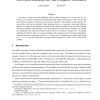Free Online Productivity Tools
i2Speak
i2Symbol
i2OCR
iTex2Img
iWeb2Print
iWeb2Shot
i2Type
iPdf2Split
iPdf2Merge
i2Bopomofo
i2Arabic
i2Style
i2Image
i2PDF
iLatex2Rtf
Sci2ools
136
Voted
JCO
2007
2007
Semi-online scheduling with "end of sequence" information
We study a variant of classical scheduling, which is called scheduling with “end of sequence” information. It is known in advance that the last job has the longest processing time. Moreover, the last job is marked, and thus it is known for every new job whether it is the final job of the sequence. We explore this model on two uniformly related machines, that is, two machines with possibly different speeds. Two objectives are considered, maximizing the minimum completion time and minimizing the maximum completion time (makespan). Let s be the speed ratio between the two machines, we consider the competitive ratios which are possible to achieve for the two problems as functions of s. We present algorithms for different values of s and lower bounds on the competitive ratio. The proposed algorithms are best possible for a wide range of values of s. For the overall competitive ratio, we show tight bounds
| Added | 15 Dec 2010 |
| Updated | 15 Dec 2010 |
| Type | Journal |
| Year | 2007 |
| Where | JCO |
| Authors | Leah Epstein, Deshi Ye |
Comments (0)

